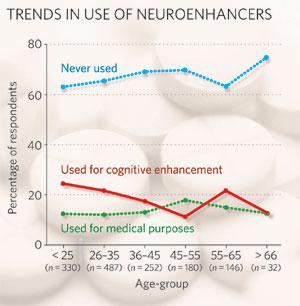We've seen our brain on drugs. Here's the dope on brainy people on drugs.

Survey results of 1400 scientists (or Nature readers, anyway) on use of neuroenhancers
Figure from Nature, "Poll results: look who's doping"
With baseball's steroid scandals seemingly behind us now -- or at least considered less newsworthy -- the press has recently turned some of its steroidal attention to neuroenhancement among major league academics. The journal Nature has taken the lead here, publishing a commentary in early March by two Cambridge University researchers who "reported," as a nicely turned New York Times story by Benedict Carey noted, "that about a dozen of their colleagues had admitted to regular use of prescription drugs like Adderall, a stimulant, and Provigil, which promotes wakefulness, to improve their academic performance. The former is approved to treat attention deficit disorder, the latter narcolepsy, and both are considered more effective, and more widely available, than the drugs circulating in dorms a generation ago."
Carey's article (and others, too; see below) is well worth reading.* But the news today is that Nature ran an open, online survey at its web site and found that 20 percent of those responding said they had used neuroenhancers such as Ritalin (an amphetamine used clinically for ADHD) and modafinil (a "wakefulness promoting" narcolepsy drug that has seen wide off-lable use not only for ADHD and depression but for increasing concentration, working memory, and other cognitive assets).
An online survey is hardly scientific, as it's likely to attract respondents with a, um, demonstrated interest in the subject. And this one was likely further warped by press attention that brought outside (i.e., possibly non-scientists) to take it.
That said, the 20 percent figure won't surprise anyone who hangs out at scientific conferences, where use of modafinil is talked of fairly casually. Many of those who use modafinil consider it a healthy substitute for coffee: better effects, fewer side effects, no demonstrated long-term harm. It sharpens attention, adds stamina, increases the power to resist distraction, and creates a smoother energy curve that lacks the jittery buzz that lots of coffee will predictably create. And some find it interferes less with sleep.
So is this bad? That question seems to flummox everyone. On its face, seemingly so: It's a drug, and we don't take drugs just to boost performance. This sits fine until you think about coffee. Is modafinil is simply a better coffee?These questions make it clear we're on a slippery slope. We'll be seeing a lot more handwringing and headscratching on this one.
Some of the more intriguing coverage so far:
The original Nature commentary, "Professor's little helper." (Nature subscription required)
An interesting pro-con discussion among academics at the Chronicle of Higher Education website.
An advice column at Wired about the competitive threat that neuroenhancement poses in the office environment. The answer, unfortunately, completely the cognitive enhancement of the drug in question (modafinil), advising the non-drug-doer to better his modafinilly enhanced coworker-competitor by working smarter rather than longer.
An fake April Fools Day press release from (not really) the NIH announcing "three new initiatives to fight the use of brain enhancing drugs by scientists." This fooled a lot of bloggers.
* The Carey article visits the inevitable comparisons with steroids in baseball. Some quoted in the article argue that academics taking drugs is different than athletes taking drugs because competition in academics in secondary -- an assertion that may strike many as questionable, given the intense competition not only for tenure but for glory and riches once tenure is secured. The most prominent scientists do well indeed. Those that don't make the cut, not so. As one anonymous scientist said of his thrice-daily does of Adderall in the the Times article, "“I’m not talking about being able to work longer hours without sleep (although that helps). I’m talking about being able to take on twice the responsibility, work twice as fast, write more effectively, manage better, be more attentive, devise better and more creative strategies.”
He makes a good point that is often missed: These drugs don't just pep you up; they sharpen and focus the brain, creating a double enhancement.
